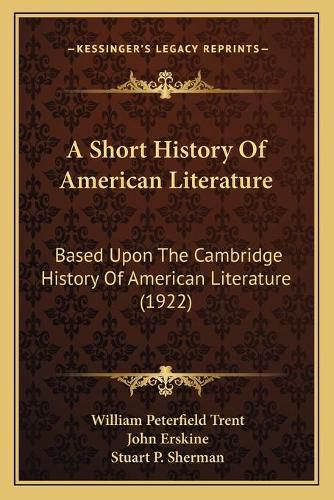Readings Newsletter
Become a Readings Member to make your shopping experience even easier.
Sign in or sign up for free!
You’re not far away from qualifying for FREE standard shipping within Australia
You’ve qualified for FREE standard shipping within Australia
The cart is loading…






General Books publication date: 2009 Original publication date: 1922 Original Publisher: G.P. Putnam’s sons Subjects: American literature Literary Collections / American / General Literary Criticism / General Literary Criticism / American / General Notes: This is a black and white OCR reprint of the original. It has no illustrations and there may be typos or missing text. When you buy the General Books edition of this book you get free trial access to Million-Books.com where you can select from more than a million books for free. Excerpt: CHAPTER IV Transcendentalists i. Emerson IT becomes more and more apparent that Emerson, judged by an international or even by a broad national standard, is the outstanding figure of American letters. Others may have surpassed him in artistic sensitiveness, or, to a criticism averse to the stricter canons of form and taste, may seem to be more original or more broadly national than he, but as a steady force in the transmutation of life into ideas and as an authority in the direction of life itself he has obtained a recognition such as no other of his countrymen can claim. And he owes this pre-eminence not only to his personal endowment of genius, but to the fact also that, as the most perfect exponent of a transient experiment in civilization, he stands for something that the world is not likely to let die. Ralph Waldo Emerson, born in Boston, 25 May, 1803, gathered into himself the very quintessence of what has been called the Brahminism of New England, as transmitted through the Bulkeleys, the Blisses, the Moodys, and the direct paternal line. Peter Bulkeley, preferring the wilderness of Satan to Laudian conformity, founded Concord in 1636; William Emerson, his descendant in the fifth generation, was builder of the Old Manse in the same town and a sturdy preacher to the minute-men at the beginning of the Revolution; and of many other ministerial ancestors stories abound which show how deeply implanted in this stock…
$9.00 standard shipping within Australia
FREE standard shipping within Australia for orders over $100.00
Express & International shipping calculated at checkout
General Books publication date: 2009 Original publication date: 1922 Original Publisher: G.P. Putnam’s sons Subjects: American literature Literary Collections / American / General Literary Criticism / General Literary Criticism / American / General Notes: This is a black and white OCR reprint of the original. It has no illustrations and there may be typos or missing text. When you buy the General Books edition of this book you get free trial access to Million-Books.com where you can select from more than a million books for free. Excerpt: CHAPTER IV Transcendentalists i. Emerson IT becomes more and more apparent that Emerson, judged by an international or even by a broad national standard, is the outstanding figure of American letters. Others may have surpassed him in artistic sensitiveness, or, to a criticism averse to the stricter canons of form and taste, may seem to be more original or more broadly national than he, but as a steady force in the transmutation of life into ideas and as an authority in the direction of life itself he has obtained a recognition such as no other of his countrymen can claim. And he owes this pre-eminence not only to his personal endowment of genius, but to the fact also that, as the most perfect exponent of a transient experiment in civilization, he stands for something that the world is not likely to let die. Ralph Waldo Emerson, born in Boston, 25 May, 1803, gathered into himself the very quintessence of what has been called the Brahminism of New England, as transmitted through the Bulkeleys, the Blisses, the Moodys, and the direct paternal line. Peter Bulkeley, preferring the wilderness of Satan to Laudian conformity, founded Concord in 1636; William Emerson, his descendant in the fifth generation, was builder of the Old Manse in the same town and a sturdy preacher to the minute-men at the beginning of the Revolution; and of many other ministerial ancestors stories abound which show how deeply implanted in this stock…